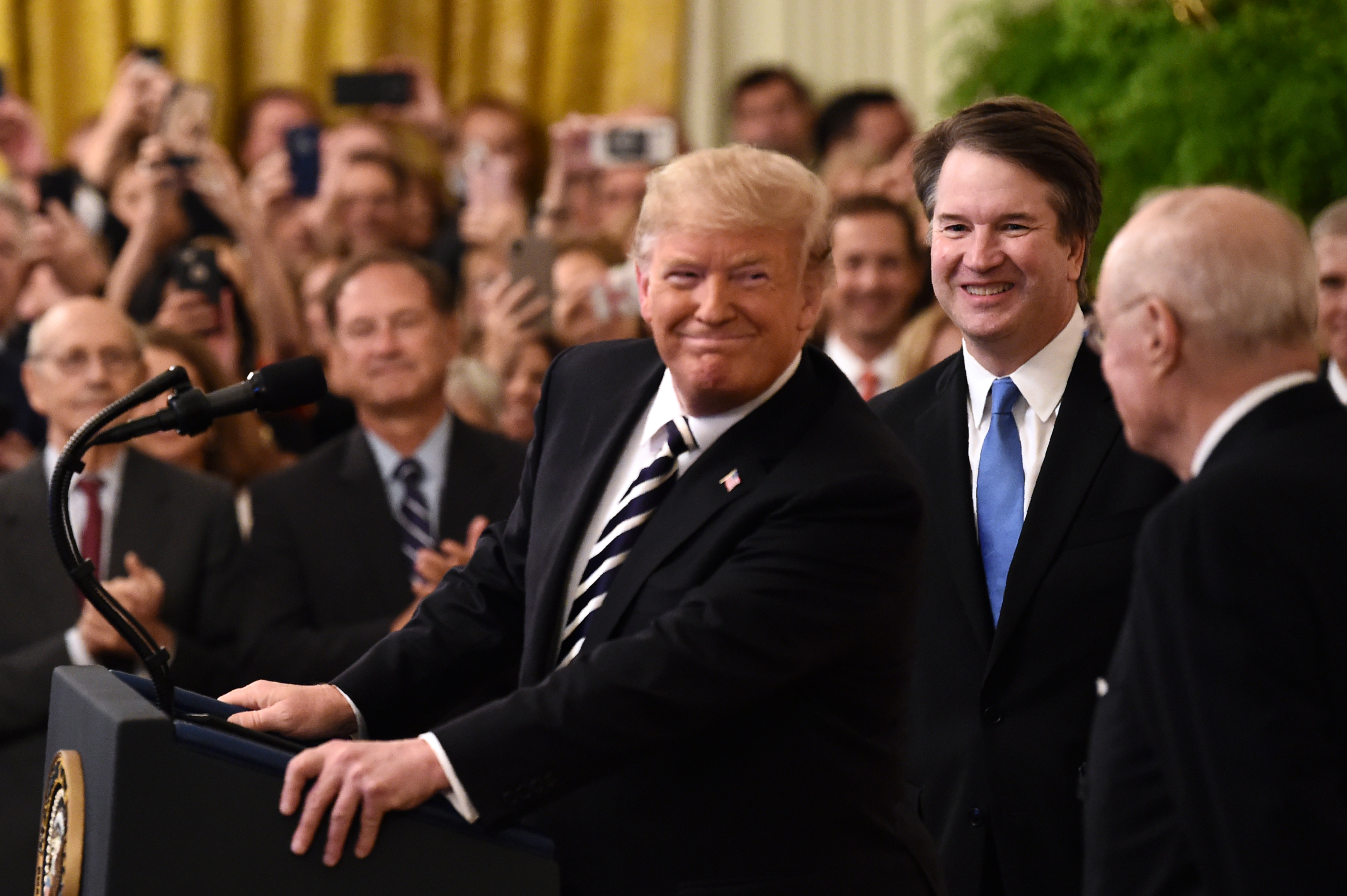With eye on vote, Trump stacks US courts with conservatives
US President Trump (L) at the swearing-in ceremony of Brett Kavanaugh (C) as associate justice of the US Supreme Court, a major landmark in Trump’s drive to fill US courts with conservative judges (Brendan SMIALOWSKI)
Washington (AFP) – President Donald Trump has stepped up his drive to fill courts across the United States with conservative judges in an effort to woo voters on the right ahead of the midterm congressional elections.
Coming off his success in appointing two judges strongly aligned with Republican ideology to the Supreme Court, Trump is duplicating that move in federal circuit and district courts — the next two levels in the US justice system.
“I have been there less than two years and I have two of them,” Trump boasted in an election rally on Monday in Texas, referring to Neil Gorsuch and Brett Kavanaugh, the conservative justices who have tilted the Supreme Court strongly toward the right.
“We have a record number of circuit court judges for the time we have been in office,” he added. “We expect to go to the all-time record.”
The US Constitution empowers the president to make lifetime appointments of judges to all three levels of federal courts, where nearly 900 judges serve. Each needs to be confirmed by the Senate, however.
Since taking office in January 2017, Trump has obtained the confirmation of 84 federal judges, compared to 43 in the same period for his predecessor, Democrat Barack Obama.
Trump has nominated some 50 more, who are awaiting the Senate’s green light.
Trump’s former White House counsel Don McGahn said they have consciously chosen some of the most conservative people possible for the positions. “Some folks that are kind of too hot for prime-time,” he described them. “The kind of people that make some people nervous.”
– Impact already felt –
Democrats are angry, but have been powerless to do anything about it because they are a minority in the Senate.
“The Trump Administration is trying to pack the courts for years to come,” Democratic Senator Kamala Harris said in a tweet. “We will fight this.”
If Republicans retain control of the Senate in the November midterm elections as expected, Trump could have the opportunity to fill another 150 vacant posts over the next two years.
The new judges are already having an impact on US society, for instance by shooting down a complaint on racial discrimination in the workplace, and supporting the removal of limits to election campaign donations, both positions backed by Republicans.
“I think it’s a huge thing,” Attorney General Jeff Sessions said last week. “We can feel a difference in some of the circuits (appeals courts) already.”
Trump calls the effort a major achievements of his presidency.
“These appointments are going to be one of the most important things, if not the most important thing, we do,” he said.
– Election issue –
Ahead of the November 6 election — in which Republicans are fighting to retain control of the two chambers of Congress — Trump’s judicial appointments are galvanizing conservative voters.
Evangelical Christians and traditional conservatives were originally skeptical of billionaire Trump, given his record of political opportunism and seeming agnosticism.
But he won their support in the 2016 presidential election by promising to appoint a committed conservative to the Supreme Court who would oppose abortion and support broad gun ownership rights.
The opportunity to stack the courts with conservatives was greater than usual when he took office: for the previous two years, Republicans in Congress had blocked dozens of Obama’s nominees, leaving 107 judgeships vacant.
The Republican Senate quickly began confirming Trump’s court picks. Even in their fervor, however, they did not get everyone through: one candidate withdrew when his legal shortcomings became evident; another was dropped after his former writings in support of the Ku Klux Klan were brought to light.
– ‘Unprecedented power grab’ –
With Republicans worried they could lose their majority in the November 6 vote, they have bent the rules in Congress to accelerate confirmations.
Fifteen were approved in one day in mid-October just ahead of the Senate going on break.
And even while it is officially in recess for the election, the Senate Judiciary Committee continues to hold confirmation hearings with nominees, angering Democrats.
“It is an unprecedented power grab that flies in the face of Senators’ constitutional duty to advise and consent on judicial nominees and makes a mockery of our Constitution and justice system,” said Jill Dash, vice president of the liberal-leaning American Constitution Society.
Disclaimer: This story has not been edited by Siliconeer and is published from a syndicated feed. Siliconeer does not assume any liability for the above story. Validity of the above story is for 7 Days from original date of publishing. Content copyright AFP.


